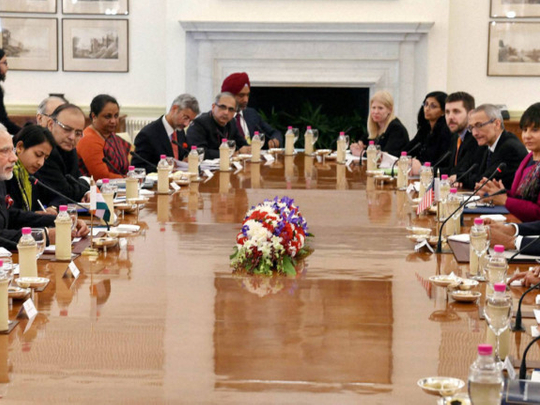
New Delhi: Breaking the logistics logjam over the US-India civil nuclear deal is the biggest takeaway for New Delhi so far as American President Barack Obama’s current visit to India is concerned. The resumption of the bilateral investment treaty was the other key announcement of the day.
Obama is the first US president to visit India twice during his tenure in White House. His first visit to New Delhi was in 2010.
Renewal of the US-India Defence Framework Agreement, bilateral cooperation in the development of clean and renewable energy, enhanced bilateral cooperation in counter-terrorism mechanisms, resumption of discussions on the social security agreement for expatriate Indians employed in the US and once again getting Washington to make an in-principle public acceptance of India’s legitimate claim to a permanent membership of the United Nations Security Council were the other highlights of the joint press interaction.
However, while the civil nuclear deal had the niggles finally fixed, there was no concrete assurance from New Delhi in ensuring India’s full compliance in enforcing a robust climate-change deal. In the light of America’s recent agreement with China to reduce carbon emissions, one had expected something substantial to emerge during Obama’s visit to New Delhi.
Addressing the media at the ballroom of Hyderabad House here yesterday afternoon, both Obama and the Indian Prime Minister Narendra Modi exuded happiness over the fact that the contentious issues over the nuclear disaster liability and insurance have now been ironed out “in conformity with Indian laws”.
Obama said: “We have achieved a breakthrough and are moving towards full implementation of the civil nuclear deal.”
Spelling out the fine print of the new understanding, India’s Foreign Ministry Spokesperson Syed Akbaruddin later said that the differences over what is commonly known as the ‘1-2-3 Agreement’ have been sorted out and this has been done in accordance with Indian legal provisions, whereby, the nuclear energy suppliers group will now be able to participate in the full implementation of the original deal signed in 2008.
New Delhi and Washington had signed a deal in 2008, under the prime ministership of Manmohan Singh, for cooperation in the generation of civil nuclear energy.
However, differences of opinion between Washington and New Delhi over the granting of a no-liability shield to the nuclear energy suppliers group in the case of any accident had seen the treaty stuck in the doldrums for six years. With yesterday’s announcement, the deck has now been cleared for both US and India to actively pursue full implementation of the civil nuclear treaty.
The second important announcement was with regard to the resumption of talks between New Delhi and Washington over India’s bilateral investment treaty with the US.
“Economic growth in both the countries is becoming stronger and we will resume dialogue on the bilateral investment treaty,” Modi said.
Yesterday’s press conference was also attended by a top-level US delegation that included Penny Pritzker, the US Secretary of Commerce; Rajiv Shah, Administrator of the US Agency for International Development; Michael Froman, US Trade Representative and Nisha Biswal, Assistant Secretary of State for South and Central Asian Affairs.
The Indian delegation included Foreign Minister Sushma Swaraj, Finance and Defence Minister Arun Jaitley and Piyush Goel, the Union Minister for Energy and Coal.
The other issue on which New Delhi found some reassuring vibes emanating from Washington was India’s attempt to seek a permanent membership of the United Nations Security Council. Commenting on India’s legitimate claims to the elite group’s membership, Obama said: “We support India’s claim to a permanent membership of the UN Security Council.”
Terming India’s relationship with the US as a “natural global partnership”, Modi said: “Mr President, in the last few months, I see a new excitement and confidence in this relationship.”
Obama thanked Modi for having invited him to be the guest-of-honour at India’s Republic Day function, saying: “I am honoured to be the first president of the United States to be present at India’s Republic Day celebrations, as well as the first American president to visit India twice. This reflects my commitment to deepen our ties with India.”












